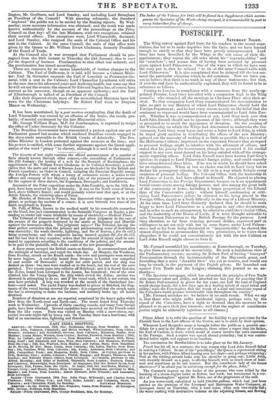POSTSCRIPT.
SATURDAY NIGHT.
The Whig outcry against Earl Grey, for his conduct in the recent nego- tiations, has led us to make inquiries into the facts; and we have learned enough to satisfy us that they- have been grossly misrepresented. Lord Grey has been described by the Whigs as the sole cause of their dis- appointment; they repeat the old cries about his" impracticability" and his " crotchets "; and accuse him of having been actuated by personal pique against Lord Palmerston. One of the ways in which we have seen the story put is, that he refused " to sit at the same Council-table with Lord Palmerston." It is also complained that he delayed till the last mo- ment the particular objection which he did entertain. Now we have rea- son to believe that there is no truth in any of these statements; but that, if ever the real facts be authentically explained, they will be found to be in substance as follows.
Coming to London in compliance with a summons from the newly-ap- pointed Premier, Lord Grey travelled with a companion high in the Whig councils; who attended all the meetings in Chesham Place after their ar- rival. To that companion Lord Grey communicated his determination to take no part in any Ministry of which Lord Palmerston should hold the Foreign Department; and lie had every reason to rely on the belief that the sentiment so expressed would have been communicated to Lord John Rus- sell. Whether it was so communicated or not, Lord Grey took care that Lord John Russell should not be ignorant of his views; although they were so presented as to avoid the appearance of dictation. On the evening of the Wednesday on which the Whigs had determined to undertake the Go- vernment, Lord Grey went home and wrote a letter to Lord John, in which he urged great caution in distributing the offices of the new Ministry; pointed out the necessity of making it as little as possible like a revival of the Melbourne Cabinet; impressed on the expectant Premier that no regard to personal feelings ought to interfere with the allotment of offices; and stated that his joining the Government, though he promised it his cordial support in any case, must depend on his being satisfied with all the arrange- ments regarding offices. Lord John Russell must have known Earl Grey's opinions in regard to Lord Palmerston's foreign policy, and could scarcely have misunderstood these hints. If he was in doubt, he should have asked for an explanation. When at last no choice was left to Lord Grey but to declare his peremptory objection, be did so in a way which forbade every suspicion of personal feeling. The Colonial Office, with the leadership in the House of Lords, had been offered to himself. He objected to placing Lord Palmerston in the Foreign Department, because such an appointment would create alarm among foreign powers, and also among the great bulk of the community at home, including a larger proportion of the Liberal than of the Conservative party: without himself condemning or criti- cizing Lord Palmerston's policy, he objected to his being placed in the Foreign Office, simply as a fresh difficulty in the way of a Liberal Ministry. At the same time, Lord Grey distinctly declared that he should be most happy to have Lord Palmerston as a colleague in any other department; and in order to such an arrangement, he offered to yield the Colonial Office, and the leadership of the House of Lords, if it were thought advisable to raise Viscount Palmerston to the British Peerage for the purpose. Lord Grey therefore, so far from evincing personal dislike, expressed perf et willingness to act not only with but in some degree under Lord Palmer- ston; and so far from being dictatorial or "impracticable," he showed the utmost disposition to accommodate his own pretensions, or to waive Omni altogether, if he could not conscientiously act with the new Cabinet u Lord John Russell might choose to form it.




























 Previous page
Previous page